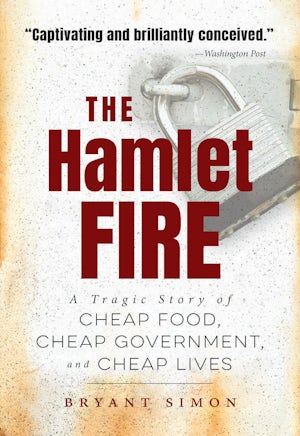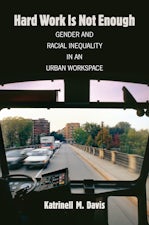The Hamlet Fire
A Tragic Story of Cheap Food, Cheap Government, and Cheap Lives
By Bryant Simon
320 pp., 6.125 x 9.25, 1 halftone, 3 maps, notes, index
-
Paperback ISBN: 978-1-4696-6026-4
Published: September 2020 -
E-book EPUB ISBN: 978-1-4696-6137-7
Published: July 2020 -
E-book PDF ISBN: 979-8-8908-5298-4
Published: July 2020
Buy this Book
- Paperback $24.95
- E-Book $9.99
For Professors:
Free E-Exam Copies
Eighty years after the Triangle Shirtwaist Fire, industrial disasters were supposed to have been a thing of the past in the United States. However, as award-winning historian Bryant Simon shows, the pursuit of cheap food merged with economic decline in small towns across the South and the nation to devalue laborers and create perilous working conditions. The Hamlet fire and its aftermath reveal the social costs of antiunionism, lax regulations, and ongoing racial discrimination. Using oral histories, contemporary news coverage, and state records, Simon has constructed a vivid, potent, and disturbing social autopsy of this town, this factory, and this time that exposes how cheap labor, cheap government, and cheap food came together in a way that was destined to result in tragedy.
About the Author
Bryant Simon is a professor of history at Temple University.
For more information about Bryant Simon, visit
the
Author
Page.
Reviews
"Captivating and brilliantly conceived."--Washington Post
"Engaging and humanizing. . . . [Simon] uses the horrific event of a devastating accident at a chicken-processing plant in rural North Carolina to examine the consequences of the modern American convenience diet, where everything is expendable."--Booklist
"The Hamlet Fire is infinitely, if painfully, readable. Simon is at turns abrupt and poetic, thoughtful and resolved. There is much that students of history can learn from Simon’s book that applies to southern food processing today."--American Historical Review
"The Hamlet Fire provides a fresh approach to the crowded field of food history, encouraging us to consider the interconnections between consumer demand, the evolution of the American diet, and the hidden costs of deregulation."--Journal of Social History



